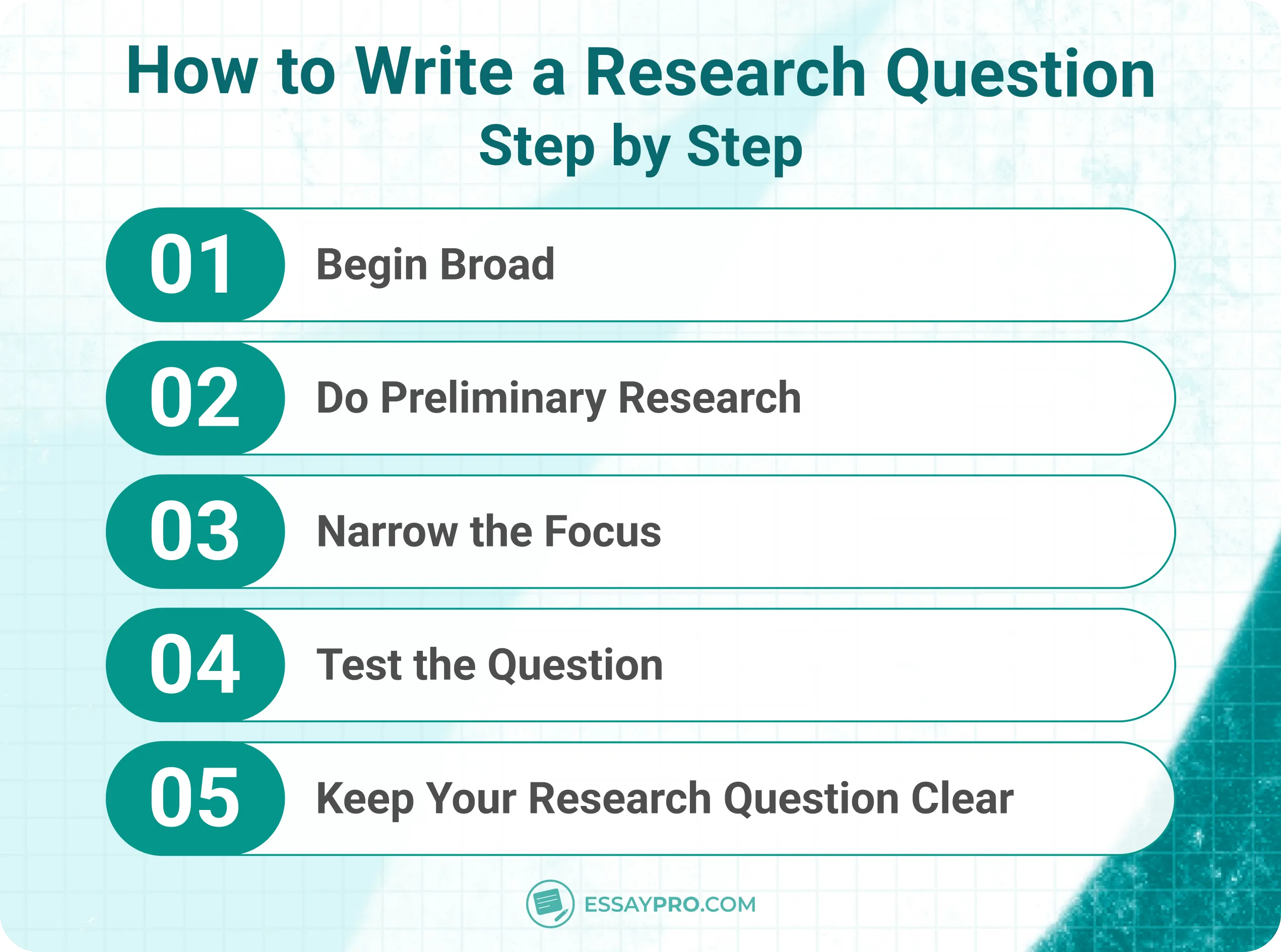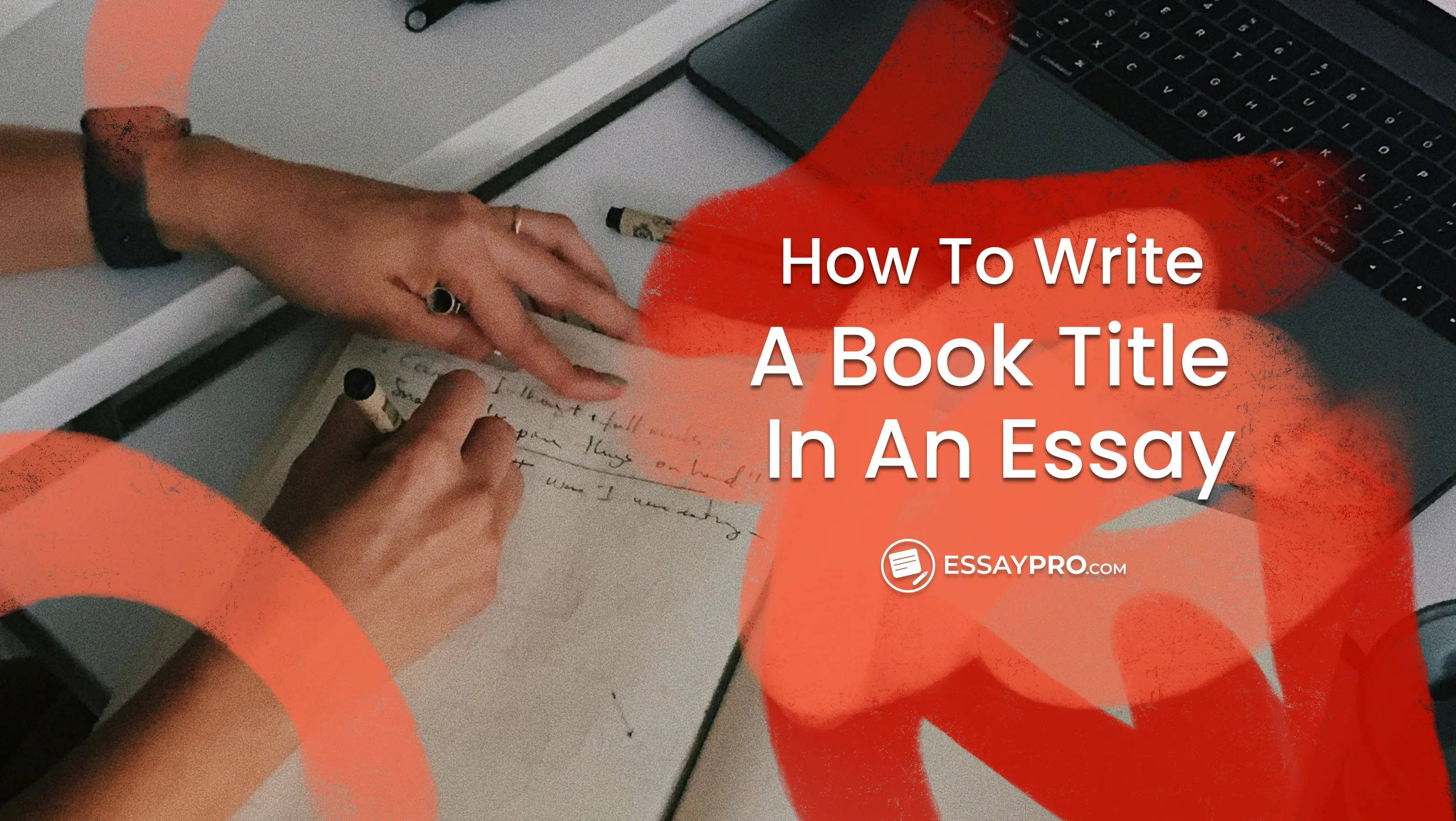A research question is the main idea that guides your entire study. It keeps you on track with the research process by reminding you of what you're really trying to find out. Every claim you make depends on that one question being clear. Every paragraph returns to it, even the conclusion follows its lead. You might need a few clever tips to develop a research question, which is exactly what this article will help you with.
We've put together the entire process of writing a research question in this article. You'll also find real research questions examples for students so you know how the right ones look. If you get stuck at this stage, you can always rely on EssayPro to step in with the right kind of guidance.


What Is a Research Question?
A research question is the central idea that drives your study. It defines what you want to find out and sets the direction for your investigation. This question also decides what information belongs in your paper and which you should let go of. A clear question turns confusion into focus when the research process feels overwhelming. It creates order in how you search for answers and how you explain what you've found. Even the best ideas lose meaning along the way without a guiding thread.
What Makes a Good Research Question?
A strong research question feels direct and deliberate. It's small enough to manage but deep enough to explore. It gives you something real to investigate. The characteristics of a good research question include clarity. They include relevance. They include feasibility. They include originality. It should connect to real issues but still leave space for discovery. When a question meets these points, it becomes the foundation for everything else you write.
Types of Research Questions
Every field asks questions differently. The type you choose determines how you gather information and what you want to find out. Most studies use either qualitative or quantitative questions. Both research methods ask for their own way of seeing and working.
Qualitative Research Questions
Qualitative research questions search for meaning. They deal with experiences, emotions, and ideas. They often begin with how or why. These questions fit studies that aim to understand people and contexts instead of measuring them.
Quantitative Research Questions
Quantitative research questions work with numbers and measurable patterns. They rely on structure, data, and results that can be tested or repeated.
If you’re thinking of buying research paper, EssayPro’s writers can structure your work so it checks all the right boxes.
How to Write a Research Question in 5 Simple Steps
A good question doesn't appear fully formed. It grows from the slow process of refining what you care about. These steps work as a simple guide on formulating a research question that feels manageable and worth answering:

1. Begin With a Broad Idea
Every project begins with a general topic. You start with something that genuinely draws (and keeps!) your attention. There's no need to be exact at this stage. Write freely. Let yourself note what feels uncertain or open-ended. Try a few rough versions of writing research questions that sound natural to you. Some will fail, but they'll teach you what doesn't fit. The aim here isn't precision yet. It's finding the spark that might lead to something meaningful.
2. Do Preliminary Research
Before shaping your question, look around to see what's already out there. Read a handful of reliable studies. Scan recent discussions. Look for themes in literature that keep coming up. Notice the gaps the researchers mention but never fully explain. Those gaps often hold potential. Short notes, written in your own words, will help you see which ideas feel fresh or worn out. Patterns will start to surface once your knowledge deepens. Sharper focus will follow close behind.
3. Narrow the Focus
Once you have enough background information, the best way to start a research paper is to narrow your idea down. It's best to choose one path and follow it through instead of trying to cover all topics at the same time. Effective research questions are in the middle between what's important and what's also realistic to study. The right one will sound balanced, but still grounded in real possibility.
4. Test the Question
A question can look fine on paper and still collapse when you try to use it. Testing saves you time later. The FINER criteria help you see if it holds up.
- Feasible – You can gather the data, find the sources, and finish the work within your limits.
- Interesting – It holds your attention and might hold someone else's, too.
- Novel – It offers a new angle or updates what's already known.
- Ethical – It can be studied in a responsible way.
- Relevant – It connects to something real, something that matters to your field or community.
A question that meets these standards is ready to grow into research that actually works.
5. Keep Your Research Question Clear
When you finally reach the stage where you form a research question, focus on clarity. The reader should see what you plan to examine without guessing. Avoid filler words. Keep it simple. The structure matters less than the precision. Two common formats often work best.
How to Connect Research Questions with Study Objectives and Outcomes
A research question should never stand on its own. It needs to connect directly to what your study hopes to achieve and the outcomes you expect to reach. Here's how you can align your objectives and outcomes to the main question:
- Clarify your main goal. Begin with the simplest truth: what do you want this study to accomplish? Write that down in plain, unpolished language. That single line becomes the center of your work. Every choice you make later returns to it. Without that framework, your research question drifts, and the project loses its shape.
- Shape your question around that goal. Let your goal dictate how you phrase the question. If your study seeks measurable change, the question should focus on data that can be counted or compared. A well-formed question doesn't need heavy academic phrasing or technical clutter.
- Match your question to your methods. Ask yourself what kind of evidence will answer it. Some questions demand statistics. Others call for interviews, observations, or close reading of behaviors. The method must grow out of the question naturally.
- Connect your outcomes to your question. Every result should point back to the question that began the work. Think of outcomes as proof that your inquiry mattered. When everything aligns, the study forms a complete thought instead of a loose collection of findings.
Example of alignment
Objective: To explore how diet affects focus among college students.
Research Question: What changes in attention levels appear when students follow a high-protein diet?
Outcome: Reliable data showing how dietary habits relate to focus and attention.
Good and Bad Research Questions Examples
The easiest way to understand what makes a question work is to see it in action. Below are short pairs that show weak and strong examples of a research question. Each good version builds on the bad one, turning vague ideas into something concrete and researchable.
- Bad: Why is social media bad for teenagers?
- Better: How does frequent social media use affect teenagers' sleep quality?
Why: The first assumes harm before evidence exists. The second isolates one effect (sleep) and makes it measurable.
- Bad: What is climate change?
- Better: What impact do rising temperatures have on crop yields in southern regions?
Why: The weak version just asks for a definition. The stronger one explores a clear outcome connected to real conditions.
- Bad: Do people like online learning?
- Better: What factors influence student satisfaction in online courses?
Why: The good question opens space for analysis instead of yes-or-no answers.
- Bad: Is exercise healthy?
- Better: How does daily aerobic exercise influence blood pressure in adults over 40?
Why: The improved question points to one habit, one result, and one group.
- Bad: Should governments help the homeless?
- Better: What policies have proven most effective in reducing homelessness in major cities?
Why: It replaces opinion with evaluation and connects directly to data.
Get thesis writing help if you have trouble formulating the main idea of your study.
Common Mistakes in Creating Research Questions
Even the strongest topics can fall apart when the question behind them is careless. When writing a research question, clarity matters more than style or length. Below are some mistakes worth avoiding and a few insights to remember when writing research questions:
- Treating curiosity as a plan. A spark of interest isn't enough. Curiosity gives you a start, but without structure, it leads to scattered research.
- Skipping the evidence check. Too many students fall in love with a question they can't realistically investigate. A question is only as strong as the proof you can gather. Before you commit, spend time on preliminary research.
- Assuming the reader knows your context. A question that's clear to you might confuse everyone else. Explain precisely who or what you're talking about, and keep the reader informed about the details of the study.
- Using vague or emotional language. Avoid judgmental words like good, bad, or important. They express opinion, not research focus.
- Ignoring feasibility. Even the best question fails if you can't realistically answer it. Think through the limits of your access. A grounded, smaller question is always stronger than a grand one that never reaches a conclusion.
Why the Research Question Matters in the Research Process
The research question is the first real decision researchers make. We keep saying how important it is to land on the right one, but now, let's talk about why this single sentence is so defining to a study.
When you come up with research questions, you are laying the building blocks of the entire project. It decides everything: what materials you'll need to gather, what belongs in your study at all... Even the methods section of research paper depends on it. Formulating this small part early on keeps your focus in place when ideas start to pull in different directions.
A study becomes a collection of facts if you don't state the main problem clearly. A well-framed research question turns curiosity into a plan of action. In the end, every study worth hearing began with a sentence strong enough to hold it together.
Final Thoughts
Every strong study begins with the right research question. It gives your work a path to follow and a reason to exist. Without that anchor, you'll find it hard to narrow down your topics and keep your arguments structured. Landing on a question is the moment where curiosity turns into direction.
If shaping that kind of question feels difficult, EssayPro can help. Finding precision takes practice, so some extra help can be better for building research questions.
FAQs
What Does a Research Question Look Like?
A good research question asks something specific. It doesn't give an opinion or make a claim. For example, look at this one: How does caffeine use affect reaction time in college students? This question focuses on one action and effect.
What Is the Proper Format for a Research Question?
A proper research question format begins with how,why, or what. It clearly presents the given topic and highlights what needs to be studied. The wording must be simple so the reader can easily understand it. It should never be vague or closed with a yes or no.
What Are the Two Main Types of Research Questions?
There are two kinds of research questions. Qualitative research explores meaning and personal experience. Quantitative research looks at facts that can be measured or counted.
How Do You Write a Research Question?
Start with a subject that holds your attention. Read enough to find what has not been answered yet. Then narrow your idea until it feels specific and manageable. Rewrite your question until it feels clear, steady, and ready to be explored.
How to Make a Research Question Qualitative?
Use words that aim for understanding, not numbers. Ask about feelings, thoughts, or personal meaning. Begin with how or why to open the question wider. Let it guide you toward insight instead of measurement.
What Is an Example of a Research Question?
Here is one example. What helps first-generation college students feel a stronger sense of belonging on campus? This question names a group and a goal. It leaves room to look deeper and to listen closely to experience.

Ana Ratishvili
Ana is a professional literary writer with a Master’s Degree in English literature. Through critical analysis and an understanding of storytelling techniques, she can craft insightful guides on how to write literary analysis essays and their structures so students can improve their writing skills.
- University of Hull. (2022). LibGuides: Dissertations & projects: Research questions. https://www.hull.ac.uk/ https://libguides.hull.ac.uk/dissertations/questions
- Muszynski, M. (2023). Research Questions. https://www.sjsu.edu/writingcenter/docs/handouts/Research%20Questions.pdf
- Cantrell, S. (n.d.). LibGuides: Systematic Reviews: 2. Develop a Research Question. https://mclibrary.duke.edu/guides https://guides.mclibrary.duke.edu/sysreview/question








